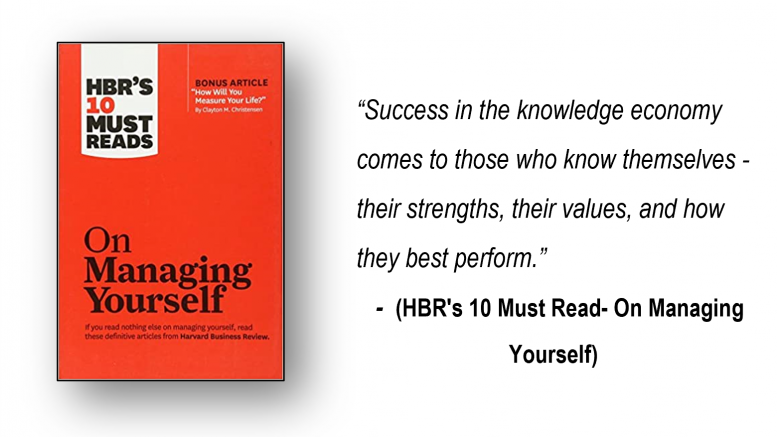HBR’s 10 Must Reads paperback series is quoted as one of the most immersive for new and experienced leaders alike. Through selected articles, the series has included timeless advice from best thinkers on areas regarding personal development and organisation building. For this month’s book review, I chose to read On Managing Oneself from the series and I was hooked from the word go. Some articles such as Manage your energy, not your time, found deeper resonance and I have journaled about it enough to introspect and bring a change in how I approach my work-life.
Like the title suggests, the book presents 10 (+1 bonus) essays that have been hand-picked after sieving through hundreds of HBR articles. What worked for me in the book was the structure and organisation of essays and how one flows into another. Every essay had some key takeaways that I am listing down here:
- How will you measure your life?
To effectively serve the true purpose of management, we need to be guided by a sense of purpose. Once we have that in place, it will help us focus on long term while avoiding focus on marginal costs helping us avoid bad decisions.
- Managing oneself
Self-awareness is the foundation of managing ourselves. The essay provides with key questions that we can ask ourselves to build a framework to understand self and our ecosystem: 1) What are my strengths? 2) How do I work? 3) What are my values? 4) Where do I belong? 5) What can I contribute?
- Management Time: Who’s got the monkey?
The author brings out three kinds of management time— boss-imposed time, system-imposed time, self-imposed time. It’s the third time where subordinates share their concerns and he further charted clear steps to build capacity for subordinates
- How resilience works
As per the essay, three shining characteristics of resilient people are calmly accepting the harsh realities, finding meaning in terrible times, developing an ability to improvise.
- Manage your energy, not your time
The author of this article shares that as compared to time; our personal energy is a renewable resource. By developing simple and implementable practices consistently, both employees and organizations can build and replenish their personal energy (personal, emotional, mental and spiritual).
- Overloaded circuits
Attention deficit trait (ADT) has become a rampant disorder, hampering a manager’s ability to effectively manage time and take smart decisions. The article shares simple steps to combat ADT such as doing the most crucial tasks during the most productive hours of the day.
- Be a better leader, have a richer life
This article highlights that to excel in each dimension of life, we can use the Friedman’s Total Leadership process. As a first step, we need to identify who and what matters the most in our lives. Then we would need to experiment and exercise small changes that enhance satisfaction and performance in all the four domains our life (work, home, community, and self).
- Reclaim your job
Its pivotal to identify priorities and adhere to investing in them. Also, in case of resource constraint, we should achieve our goals by working strategically.
- Moments of greatness: entering fundamental state of leadership
Often ask yourself—Am I results oriented, Am I internally directed, Am I other focussed, Am I externally open?
- What to ask the person in mirror
To find the right answers, you need to ask the right set of questions to your own selves. Some of the basic questions that the essay details out are—Visions and priorities, managing time, feedback, succession planning, evaluation and alignment, leading under pressure, and staying true to yourself.
- Primal leadership, the hidden driver of great performance
Mood contagion is how a manager’s mood affects everyone else’s in the team. To adjust our styles to be able to build a conducive environment, we need to tread consciously on the path to self-discovery. Ask yourselves: What do you want to be, where are you now, how do you get here from there, how you want to make change stick, who can help you.
The book will give you a lot of opportunities to understand areas of improvement for yourself and will also give you measures to undertake to see through those areas. The only area where this book could have done better for me is by elucidating areas of failures to explain how certain measures could have worked and brought out a positive outcome.
Additionally, I think this book will be an apt for mid-senior leadership and not as much for beginners or early professionals as the content is more centred around managerial aspect.
Overall I would give the book a 8.5/10.
The views and opinions published here belong to the author and do not necessarily reflect the views and opinions of the publisher.



Be the first to comment on "On Managing Oneself- HBR’s 10 Must Reads"